4-(METHYLTHIO)-6-OXO-2-PHENYL-1,6-DIHYDROPYRIMIDINE-5-CARBONITRILE
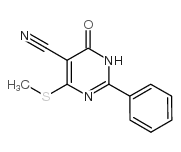
4-(METHYLTHIO)-6-OXO-2-PHENYL-1,6-DIHYDROPYRIMIDINE-5-CARBONITRILE structure
|
Common Name | 4-(METHYLTHIO)-6-OXO-2-PHENYL-1,6-DIHYDROPYRIMIDINE-5-CARBONITRILE | ||
|---|---|---|---|---|
| CAS Number | 15908-64-2 | Molecular Weight | 243.28400 | |
| Density | 1.3g/cm3 | Boiling Point | N/A | |
| Molecular Formula | C12H9N3OS | Melting Point | N/A | |
| MSDS | N/A | Flash Point | N/A | |
| Name | 4-methylsulfanyl-6-oxo-2-phenyl-1H-pyrimidine-5-carbonitrile |
|---|---|
| Synonym | More Synonyms |
| Density | 1.3g/cm3 |
|---|---|
| Molecular Formula | C12H9N3OS |
| Molecular Weight | 243.28400 |
| Exact Mass | 243.04700 |
| PSA | 94.84000 |
| LogP | 2.03048 |
| Index of Refraction | 1.667 |
Synonym: Section 2 - COMPOSITION, INFORMATION ON INGREDIENTS
Risk Phrases: 20/21/22 36/37/38 Section 3 - HAZARDS IDENTIFICATION EMERGENCY OVERVIEW
Harmful by inhalation, in contact with skin and if swallowed. Irritating to eyes, respiratory system and skin. Potential Health Effects Eye: Causes eye irritation. Skin: Causes skin irritation. Harmful if absorbed through the skin. Ingestion: Harmful if swallowed. May cause irritation of the digestive tract. Inhalation: Harmful if inhaled. Causes respiratory tract irritation. Chronic: Not available. Section 4 - FIRST AID MEASURES Eyes: Flush eyes with plenty of water for at least 15 minutes, occasionally lifting the upper and lower eyelids. Get medical aid. Skin: Get medical aid. Flush skin with plenty of water for at least 15 minutes while removing contaminated clothing and shoes. Ingestion: Get medical aid. Wash mouth out with water. Inhalation: Remove from exposure and move to fresh air immediately. If not breathing, give artificial respiration. If breathing is difficult, give oxygen. Get medical aid. Notes to Physician: Treat symptomatically and supportively. Section 5 - FIRE FIGHTING MEASURES General Information: As in any fire, wear a self-contained breathing apparatus in pressure-demand, MSHA/NIOSH (approved or equivalent), and full protective gear. Extinguishing Media: Use water spray, dry chemical, carbon dioxide, or chemical foam. Section 6 - ACCIDENTAL RELEASE MEASURES General Information: Use proper personal protective equipment as indicated in Section 8. Spills/Leaks: Absorb spill with inert material (e.g. vermiculite, sand or earth), then place in suitable container. Vacuum or sweep up material and place into a suitable disposal container. Section 7 - HANDLING and STORAGE Handling: Avoid breathing dust, vapor, mist, or gas. Avoid contact with skin and eyes. Storage: Store in a cool, dry place. Store in a tightly closed container. Section 8 - EXPOSURE CONTROLS, PERSONAL PROTECTION Engineering Controls: Facilities storing or utilizing this material should be equipped with an eyewash facility and a safety shower. Use adequate ventilation to keep airborne concentrations low. Exposure Limits CAS# 15908-64-2: Personal Protective Equipment Eyes: Not available. Skin: Wear appropriate protective gloves to prevent skin exposure. Clothing: Wear appropriate protective clothing to prevent skin exposure. Respirators: Follow the OSHA respirator regulations found in 29 CFR 1910.134 or European Standard EN 149. Use a NIOSH/MSHA or European Standard EN 149 approved respirator if exposure limits are exceeded or if irritation or other symptoms are experienced. Section 9 - PHYSICAL AND CHEMICAL PROPERTIES Physical State: Solid Color: Not available. Odor: Not available. pH: Not available. Vapor Pressure: Not available. Viscosity: Not available. Boiling Point: Not available. Freezing/Melting Point: 312 - 314 deg C Autoignition Temperature: Not available. Flash Point: Not available. Explosion Limits, lower: Not available. Explosion Limits, upper: Not available. Decomposition Temperature: Solubility in water: Specific Gravity/Density: Molecular Formula: C12H9N3OS Molecular Weight: 243.29 Section 10 - STABILITY AND REACTIVITY Chemical Stability: Stable under normal temperatures and pressures. Conditions to Avoid: Incompatible materials. Incompatibilities with Other Materials: Strong oxidizing agents, strong acids. Hazardous Decomposition Products: Carbon monoxide, oxides of nitrogen, oxides of sulfur, carbon dioxide. Hazardous Polymerization: Has not been reported Section 11 - TOXICOLOGICAL INFORMATION RTECS#: CAS# 15908-64-2 unlisted. LD50/LC50: Not available. Carcinogenicity: 4-(Methylthio)-6-oxo-2-phenyl-1,6-dihydropyrimidine-5-carbonitrile - Not listed by ACGIH, IARC, or NTP. Section 12 - ECOLOGICAL INFORMATION Section 13 - DISPOSAL CONSIDERATIONS Dispose of in a manner consistent with federal, state, and local regulations. Section 14 - TRANSPORT INFORMATION IATA Shipping Name: NITRILES, SOLID, TOXIC, N.O.S.* Hazard Class: 6.1 UN Number: 3276 Packing Group: III IMO Shipping Name: TOXIC SOLID, ORGANIC, N.O.S. Hazard Class: 6.1 UN Number: 2811 Packing Group: III RID/ADR Shipping Name: TOXIC SOLID, ORGANIC, N.O.S. Hazard Class: 6.1 UN Number: 2811 Packing group: III Section 15 - REGULATORY INFORMATION European/International Regulations European Labeling in Accordance with EC Directives Hazard Symbols: XN Risk Phrases: R 20/21/22 Harmful by inhalation, in contact with skin and if swallowed. R 36/37/38 Irritating to eyes, respiratory system and skin. Safety Phrases: S 22 Do not breathe dust. S 26 In case of contact with eyes, rinse immediately with plenty of water and seek medical advice. S 36/37/39 Wear suitable protective clothing, gloves and eye/face protection. WGK (Water Danger/Protection) CAS# 15908-64-2: No information available. Canada None of the chemicals in this product are listed on the DSL/NDSL list. CAS# 15908-64-2 is not listed on Canada's Ingredient Disclosure List. US FEDERAL TSCA CAS# 15908-64-2 is not listed on the TSCA inventory. It is for research and development use only. SECTION 16 - ADDITIONAL INFORMATION N/A |
| HS Code | 2933599090 |
|---|
|
~94% 
4-(METHYLTHIO)-... CAS#:15908-64-2 |
| Literature: Goto, Taiji; Shiina, Akiko; Yoshino, Toshiharu; Mizukami, Kiyoshi; Hirahara, Kazuki; Suzuki, Osamu; Sogawa, Yoshitaka; Takahashi, Tomoko; Mikkaichi, Tsuyoshi; Nakao, Naoki; Takahashi, Mizuki; Hasegawa, Masashi; Sasaki, Shigeki Bioorganic and Medicinal Chemistry, 2013 , vol. 21, # 22 p. 7025 - 7037 |
|
~89% 
4-(METHYLTHIO)-... CAS#:15908-64-2 |
| Literature: Kohra, Shinya; Tominaga, Yoshinori; Hosomi, Akira Journal of Heterocyclic Chemistry, 1988 , vol. 25, p. 959 - 968 |
|
~57% 
4-(METHYLTHIO)-... CAS#:15908-64-2 |
| Literature: Kohra, Shinya; Tominaga, Yoshinori; Matsuda, Yoshiro; Kobayashi, Goro Heterocycles, 1983 , vol. 20, # 9 p. 1745 - 1750 |
|
~% 
4-(METHYLTHIO)-... CAS#:15908-64-2 |
| Literature: Agarwal, Nidhi; Raghuwanshi, Sandeep K.; Upadhyay; Shukla; Ram, Vishnu J. Bioorganic and Medicinal Chemistry Letters, 2000 , vol. 10, # 8 p. 703 - 706 |
|
~45% 
4-(METHYLTHIO)-... CAS#:15908-64-2 |
| Literature: Richter, Monika; Vogt, Almut; Augustin, Manfred; Strauss, Karin Zeitschrift fuer Chemie (Stuttgart, Germany), 1989 , vol. 29, # 12 p. 443 - 444 |
|
~% 
4-(METHYLTHIO)-... CAS#:15908-64-2 |
| Literature: Lorente, Antonio; Garcia, M. Luisa; Fernandez, Misericordia; Soto, Jose L. Heterocycles, 1992 , vol. 34, # 8 p. 1573 - 1582 |
| Precursor 10 | |
|---|---|
| DownStream 1 | |
| HS Code | 2933599090 |
|---|---|
| Summary | 2933599090. other compounds containing a pyrimidine ring (whether or not hydrogenated) or piperazine ring in the structure. VAT:17.0%. Tax rebate rate:13.0%. . MFN tariff:6.5%. General tariff:20.0% |
| 5-cyano-6-methylthio-2-phenyl-4(3H)pyrimidone |
| 4-(methylthio)-6-oxo-2-phenyl-1,6-dihydropyrimidine-5-carbonitrile |
| HMS546N10 |
| 3,4-dihydro-6-methylthio-4-oxo-2-phenylpyrimidine-5-carbonitrile |
| 5-cyano-6-methylthio-4-oxo-2-phenyl-3,4-dihydropyrimidine |
| 5-pyrimidinecarbonitrile,1,6-dihydro-4-(methylthio)-6-oxo-2-phenyl |
| 3,4-dihydro-6-methymercapto-4-oxo-2-phenylpyrimidine-5-carbonitrile |
| 3,4-dihydro-6-methylthio-2-phenyl-4-oxopyrimidine-5-carbonitrile |
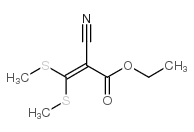
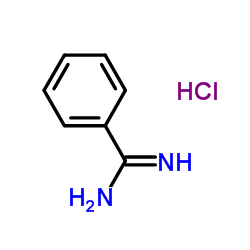
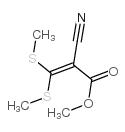
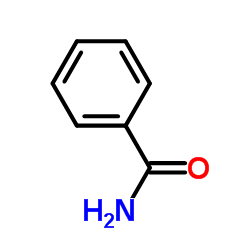
![2-[DI(METHYLTHIO)METHYLIDENE]MALONONITRILE structure](https://image.chemsrc.com/caspic/249/5147-80-8.png)
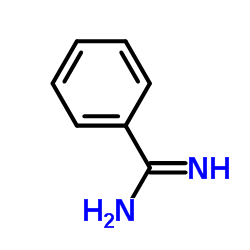

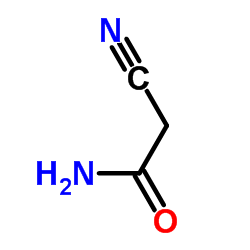
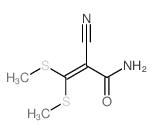
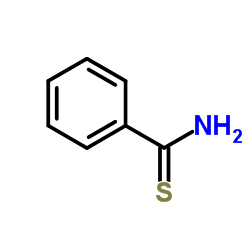
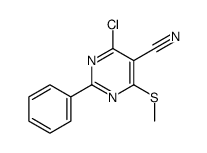 CAS#:118996-61-5
CAS#:118996-61-5